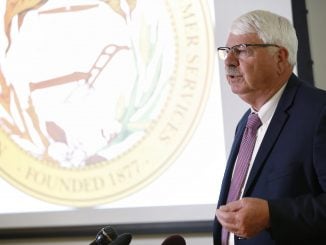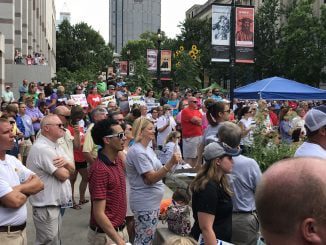This November, North Carolinians will decide again who will lead the Department of Agriculture for the next four years: current Republican Agriculture Commissioner Steve Troxler, who owns Guilford County’s Troxler Farms, or Democrat Sarah Taber, who has put forward some …unusual views about farming.
North Carolina’s ag sector has boomed during Commissioner Troxler’s tenure. But Taber says she wants transform the entire industry, from the crops we grow to how we grow them (under what legal authority she would do this, we don’t really know).
She launched her campaign with a lengthy opinion piece in the left-wing outlet The Nation, targeting something she calls “farm radicalization.” Taber apparently believes that rural farmers are a threat to democracy.
Here’s what she wrote: “Farm radicalization isn’t just a local problem. Farm outfits that hire undocumented workers put serious money behind hard-right legislators and sheriffs who pledge to collaborate with ICE. That means local country politics can get ugly. And those ugly politics don’t stay local. They can undermine democracy for the whole state.”
That’s a wild unsubstantiated accusation.
Having trouble keeping up? So are we.
But that’s not even the most bizarre thing Taber has put forward. On her website, Taber calls for replacing North Carolina staple crops of tobacco, soybeans and corn with alternative crops. While her ideas may look nice to an ivory tower academic sipping tea while reading Taber’s white paper through bifocals, North Carolina farmers already know that the real world of farming is much more complex and her unproven academic ideas will not work.
First, most farmers cannot obtain crop insurance at a reasonable rate to cover these alternative crops if it exists at all, risking the long-term financial health of family farms.
Second, it seems apparent that Taber’s preferred policy agenda is replacing corn, soybeans and tobacco with alternative crops. Taber claims that if everything goes perfectly her plan would generate $7 billion over a decade, or about $700 million per year.
The problem is the crops she proposes replacing generate way more revenue than that. According to a 2019 study, tobacco alone contributes $688 million annually, corn contributes $456 million annually and soybeans contribute $608 million annually to North Carolina’s economy. It makes no sense to replace $1.7 billion worth of crops for $700 million worth of crops.
No wonder North Carolina farmers haven’t adopted her approach.
It should also go without saying that the commissioner of Agriculture doesn’t just tell farmers what to produce on their farms. It’s not clear to us that Taber knows this.
Finally, Taber doesn’t seem to have a plan to promote North Carolina pork and poultry. Our state leads the nation in hog farming and chicken production. These sectors power North Carolina agriculture’s tremendous growth. Voters deserve to know how the next commissioner of Agriculture plans to interact with these family farmers.
Meanwhile, under Commissioner Troxler’s leadership for the past 20 years, North Carolina’s agriculture sector has grown from $59 billion to record-breaking amounts seen today. In 2023, ag had an economic impact of $111.1 billion, surpassing the record of $103.2 billion set the year before.
The economic data tells one story: North Carolina agriculture is growing and there is room for everyone to benefit from this growth.
A 2017 study found that agriculture supported over 700,000 jobs across the Tar Heel state, employing people in all 100 counties. We’re the top producer of sweet potatoes and flue-cured tobacco. We’re second in poultry and egg production, not to mention all of the catfish, burley tobacco, peanuts, blueberries, pumpkins, cotton, apples, tomatoes, and many more fruits and vegetables that Americans find at the supermarket.
However, this election cycle, instead of championing policies that led to 188% growth in economic activity, Democrat Sarah Taber is pushing out-of-touch policies that risk agriculture’s future.
North Carolina voters face a choice this November. Stay the course with a family farmer in Commissioner Steve Troxler who has helped growth North Carolina’s agriculture sector flourish.
Or select an academic whose policies may lead to economic catastrophe.
Peter Daniel Sr. is chairman of the NC Ag Partnership.


